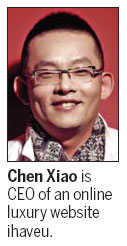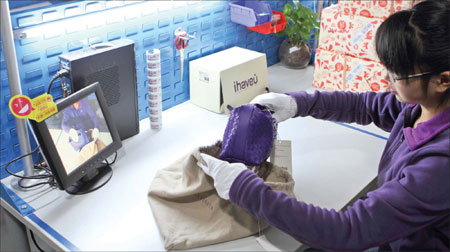Authorized big deal
Updated: 2013-02-01 09:14
By Chen Yingqun and Lin Jing (China Daily)
|
|||||||||||
|
An employee at ihaveu.com packs a Bottega Veneta bag before delivery to a customer. China's online luxury business is expanding steadily to meet high market demand. Provided to China Daily |
Getting the right to sell a luxury brand is crucial to the growing e-commerce market-but there's a dilemma over supply and demand
Chinese online luxury retailers are expecting more product authorizations from international brands this year, as the industry in China continues to expand steadily following a few years of rapid growth.
The problem, however, now lies in getting sufficient supplies of luxury products - in which rarity and exclusivity are often inherent - to meet the high and ever-increasing demand, and to reduce the instances of counterfeiting.
 |
"We are looking for more authorized products, which will help eliminate the counterfeits in the market, as well as smooth their transition from offline to online," says Chen Xiao, CEO of ihaveu.com, an online luxury website.
Chen, who has been in the Internet business for more than 10 years, says it is only a matter of time before the big brands seek growth online.
He says that though more luxury brands want to reach Chinese consumers, high rental and labor costs in big cities are still hindrances for opening high-end shopping malls in central business districts.
"The market for high-end shopping malls is almost saturated now, while purchasing luxuries online has become the trend," says Chen.
He adds that the highest spending by one person on Alipay, China's biggest online payment system operated by the Alibaba Group, was about 10 million yuan ($1.6 million; 1.19 million euros) in 2012. Even on his own website, which has been running for about two years, the highest spending reached 2 million yuan.
Before establishing ihaveu.com, Chen bought many luxury brands, with a particular interest in bags and suits. But rather than go to a shopping center, he chose to purchase from overseas websites.
"For most people who can afford luxuries, time is extremely precious, and shopping in the mall is very time consuming," he says. "When I finish my work late at night, malls are closed. And sometimes they cannot provide the size I am looking for. Then there's the time spent on transportation and finding a parking lot in big cities, which is usually quite unpleasant."
Online luxury sales started in 2009, and saw explosive growth over the following two years, with about 11 billion yuan of revenue in 2011, growing to 16 billion yuan in 2012, up 45 percent, according to iResearch, a leading market research firm. The forecast for sales in 2013 is 22 billion yuan, with more than 80 percent from third-party e-commerce sites.
5LUX.com was among the first online websites for luxury goods. It has now about 1.5 million registered members and is selling 350 international brands, with an average price of about 3,000 yuan an item. The company's revenue in 2012 doubled that of 2011.
Chen's ihaveu.com, which sells about 400 luxury brands with an average price of $400 each, witnessed a growth of about 80 percent in its turnover in 2012.
Yet, despite the quick growth, the industry did experience setbacks, caused by low-price strategies and supply shortage.
"The whole industry saw a dramatic fluctuation in 2012. It was hot at the beginning and soon became cold, which we never expected," says Sun Feiya, CEO of 5LUX.com
The main problem is meeting the demand, Sun says. At present, online luxury retailers get their supplies through three channels - overseas outlets, agents or directly from the brands.
But most luxury brands are not keen on granting authorizations to Chinese e-commerce companies, which makes it difficult to obtain sufficient supplies of genuine goods.
As a result, counterfeit products were frequently reported on e-commerce websites, which cast a shadow over the whole industry.
"Supply sources will consistently bother the industry, so cooperating with more brands directly will be an important part of our business," Sun says.
Today's Top News
List of approved GM food clarified
ID checks for express deliveries in Guangdong
Govt to expand elderly care
University asks freshmen to sign suicide disclaimer
Tibet gears up for new climbing season
Media asked to promote Sino-Indian ties
Shots fired at Washington Navy Yard
Minimum growth rate set at 7%
Hot Topics
Lunar probe , China growth forecasts, Emission rules get tougher, China seen through 'colored lens', International board,
Editor's Picks

|

|

|

|

|

|






